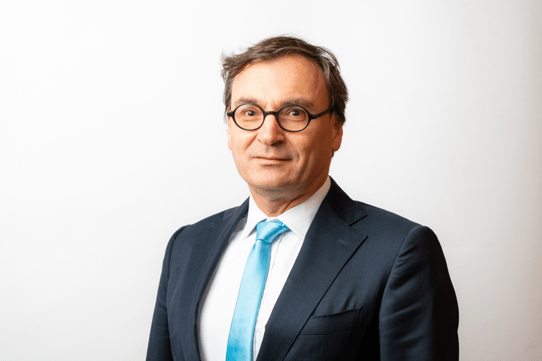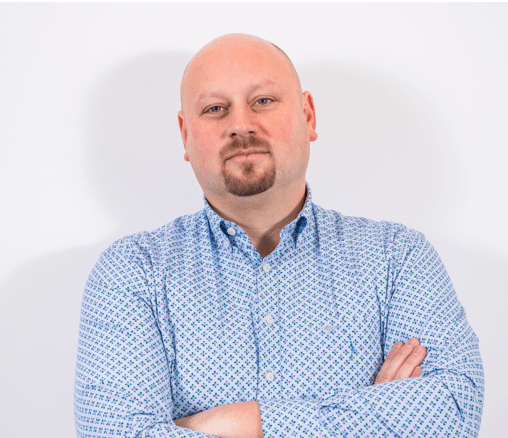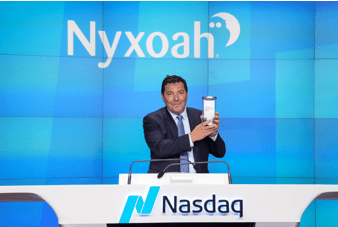At the end of October, it was announced that Datacenter United (DCU) would take over the four data centers from Proximus. DCU’s shareholders, infrastructure investor TINC and Friso Haringsma (DCU’s CEO), attracted a financially strong partner in the British group Cordiant to make this agreement possible. The latter’s entry has therefore redesigned DCU’s shareholder structure: Cordiant and TINC each hold 47.5% of DCU and Friso Haringsma owns the remaining 5%. We spoke at the same time as the CEO of TINC, Manu Vandenbulcke and the CEO of DCU, Friso Haringsma, to explain this deal and especially to highlight their strategy and the prospects around data centers.
Who are they?

Manu Vandenbulcke is CEO of TINC Development Partners, an investor that takes stakes through a number of entities, including the listed TINC, in a wide range of infrastructure ranging from public infrastructure such as public-private partnerships, digital infrastructure, renewable energy and selective real estate. The group has been doing this for 15 years and has been working with Friso Haringsma on the expansion of DCU for about 4 years.

Friso Haringsma founded Datacenter United in Antwerp 14 years ago and is today CEO of the group. After the acquisition of the Proximus data centers, the group is now active at 13 locations in Flanders and Brussels. DCU offers colocation services with airframe spaces where companies can place their own server equipment. The team, currently 32 employees, will grow to about 50 in the coming years. Haringsma is also co-founder and president of the Belgian Association for Digital Infrastructure founded to support the sector and represent Belgium in the digital landscape.
What does a data center actually do and what is the added value of DCU?
Friso Haringsma: A data center fulfills three important functions. It connects different networks and ensures the transfer of data between locations. It provides a safe place to store data, so that it remains accessible to its users. It processes and analyzes data, which is essential for the operational needs of companies. We create an environment similar to a large parking garage, where separate areas or floors are only accessible to specific customers, often with additional restrictions for emergencies. In terms of physical security, our data centers are equipped with advanced security systems. This includes access restrictions, alarm systems, and even security personnel to ensure physical access. In addition, we pay a lot of attention to logical security. This is just as important, because access to systems can also take place via networks and software. We have a wide range of certifications and implement strict security measures and conduct regular tests to ensure that only authorized users can access our systems.
How does DCU stand out from the competition? And how important are you in Belgium?
Friso Haringsma: In the past, a data center was a box where the customer had to bring his data. We started to bring the data center to the customer himself. And today, customers with us have the option of placing their data within a radius of 40 kilometers. Our geographically dispersed data centers are interconnected, which allows us to provide a strong and reliable solution. A key feature of our industry is transparency about where the data is located, especially in the context of regulations such as the GDPR. Customers want security and control over their data, and we are the market leader in this area with our 13 geographically dispersed locations. Our target group is diverse. We focus not only on local SMEs and end users, but also on larger companies such as banks, insurers, transport companies and chemical industries that want to manage their IT infrastructure themselves. In addition, we work with integrators who provide IT solutions to these companies, and we also serve larger cloud providers, both internationally and locally. Finally, telecom providers also play an important role in our ecosystem, as they offer their services to end customers through our data centers.
Why did you make the transaction with Proximus?
Friso Haringsma: The transaction with Proximus was strategically important for several reasons. First, it expanded our presence, especially in Brussels, where we previously only had a small location that did not meet the growing demand. This expansion allows us to offer a wider range of services and better respond to the needs of our customers. Secondly, the partnership with Proximus is a valuable collaboration, as Proximus is an important customer. This gives us a strong position in the market and opens doors for new business opportunities. It also strengthens our visibility, both within Belgium and internationally, making us more attractive to future customers. In addition, this transaction will allow us to strengthen and promote our other locations in Europe from a central point in Brussels. This contributes to the growth of our company and our services in the region.
Are there any such deals with telecom players in the pipeline? And if so, why are they rejecting this activity?
Friso Haringsma: There are indeed more such deals with telecom players possible. Many of them, especially in Europe, are at a pivotal point where managing data centers is no longer a core business. While these data centers are valuable assets, telecom companies face significant challenges. Firstly, its management is very capital-intensive. In addition, the demand for electricity and higher density per square meter is increasing, which brings additional concerns. In addition, regulations and sustainability requirements are becoming increasingly strict, which makes it difficult for telecom companies to meet the (future) requirements. These factors lead telecom companies to choose to divest their data centers. This is a European trend that is likely to develop further.
As an investor, how do you see the market evolving?
Manu Vandenbulcke: As an investor, I still see many opportunities for growth in the market, especially by taking over existing data centers. DCU is excellently positioned thanks to its expertise and experience in this niche. Many companies, such as Proximus, do not consider data centers as their core business but as a means to support their other services. This creates room for DCU to act as a specialist. This is exactly the reason why the deal with Proximus came about. We are closely monitoring market developments to see which companies may want to divest their data centers. Since our first investment in DCU in 2020, we have already made several smaller acquisitions, together with TINC. We call this the ‘buy and build’ strategy, in which we expand our geographical presence. However, taking over data centers is a capital-intensive business.
Were you not actually planning to sell your stake in DCU completely?
Manu Vandenbulcke: About a year ago, we started a strategic exercise to explore the growth opportunities because, as just mentioned, the investment tickets are getting bigger and bigger. There were rumors that TINC wanted to sell its stake in DCU, but that was not accurate. A simple sale was just one of the options; our preference was to help build DCU’s growth story. We have had discussions with various parties and eventually entered into a partnership with Cordiant. The British group acquires 50% of the company and brings in new capital, specifically for the acquisition of the Proximus data centers. This partnership ensures a broader shareholder base, which makes us financially stronger. It will enable us to play an active and leading role in the consolidating data center market in the future. We are now better armed, also financially, to grow in the long term and benefit from the consolidation trends in the industry.
What is your added value for DCU? Also on an operational level?
Manu Vandenbulcke: The operational aspects are very clearly up to DCU and his team. What we and Cordiant bring is financial firepower. And we also have experience in growing a company through selective acquisitions. So together with Cordiant, we bring a bit of M&A experience to the table. And that fits in nicely with DCU’s ambitions to continue to grow in Belgium. An important aspect that we have noticed in recent years is that when we bring in customers like Proximus, DCU often becomes responsible for business-critical data of that customer. DCU’s financial robustness as a supplier has therefore become a crucial element, especially for quality customers. When we engage with a player like Proximus, governments, or even European institutions, it is essential that we not only meet ESG objectives and operational requirements, but also have a solid financial basis.
How do you actually see DCU growing in the coming years?
Friso Haringsma: DCU foresees growth in several areas in the coming years. In Belgium, we are seeing an important trend in which local IT environments are increasingly moving to external data centers. Although the colocation market is currently around 100 megawatts, the total capacity of distributed local IT systems is twice as large. This indicates a significant upcoming shift, with many companies moving their IT infrastructure to colocation data centers or partially to the public cloud. This movement provides a solid foundation for future growth and stability. In addition, there is the growth of the data sector itself. The demand for data storage and processing continues to increase, leading existing providers to expand their services and tap into new markets. There are also emerging technologies such as AI and augmented reality. These technologies require vast amounts of data, as well as significant space, power, and connectivity. It is essential for DCU to prepare for these developments. We need to make sure we have the capacity and flexibility to meet the growing demand. This means investing in infrastructure, technology and human resources.
There are also plans to expand the existing sites. How will this go?
Friso Haringsma: We want to add more power capacity to our existing sites and prepare them for the future, given the changing market expectations, which represent a budget of tens of millions of euros for the coming years. Consider, for example, a higher power density. We want to ensure that we meet these requirements while improving our efficiency and efficiency in terms of sustainability in the best possible way. It is a sector that operates in the long term and requires critical attention.
How important will data centers become in TINC’s range of activities?
Manu Vandenbulcke: The digital aspect is becoming increasingly important within our portfolio. We not only have participations in DCU, but also in a fiber optic company in the Netherlands and France. We expect this segment to become even more important within our four branches. Digital infrastructure is also a major concern for infrastructure investors in general.
Will you continue to support DCU in their growth story?
Manu Vandenbulcke: Together with Cordiant, we have mobilized a considerable sum of money to take over the Proximus data centers. This acquisition is a strategic step that will enable us to further strengthen our position in the market. The first priority now is to ensure that the integration of this acquisition goes smoothly. This includes ensuring that funding is properly arranged and that DCU’s existing growth plans are effectively executed and funded across all of our data centers. In addition, we will continue to actively look at expanding our presence in the market. There are numerous potential targets that we are investigating. We believe that in the Belgian market, not only operationally, with our customer base, but also with our capital base, we have the scale to truly become a number 1 or 2 in the colocation segment. We also expect to have a robust platform that will allow us to take advantage of opportunities outside the colocation segment.
Are you planning to grow outside Belgium with the British company Cordiant?
Manu Vandenbulcke: With TINC, we are currently active with participations in France, Belgium, the Netherlands and Ireland. These are the countries where we traditionally feel comfortable. And in those countries, we are indeed going to look at taking new participations within our digital infrastructure component as well. Whether this will happen through DCU remains to be seen and will depend to a large extent on the ambition that DCU and Cordiant have. The digital world does not stop at national borders, so that is an overwriting story anyway.
What will be the importance of AI on the development of data centers?
Friso Haringsma: AI is becoming increasingly important, comparable to the rise of the cloud in the past. We expect a significant portion of future growth in the data center industry to come from AI applications. We are already seeing our current customers cautiously starting to experiment with AI, often as a form of research and development based on their own needs or wants of their customers. This presents a new opportunity for the sector and can lead to a flood of potential customers. In our investments for the future, we focus on ensuring that our data centers can offer environments suitable for high compute or AI applications, so that we can offer higher densities. We notice that there is already demand from companies that are active in sectors such as video, where a lot of images are processed and where people want to apply intelligence to those images.
Data centers also use a lot of energy. How do you deal with that?
Friso Haringsma: Energy is indeed an important topic, involving various stakeholders. We see ourselves as a kind of provider of ‘parking boxes’ for servers; We offer the space, but we don’t always have control over the energy consumption of the equipment used by our customers. The biggest responsibility lies with the customer and their suppliers. Nevertheless, we can do our bit by working as efficiently as possible and minimizing energy losses. We invest in green energy and participate in sustainability initiatives to offset our consumption. We try to make customers aware of their energy consumption, for example by encouraging them to use eco-modes and not to run the equipment at full capacity unnecessarily. In addition, we are a member of the Climate Neutral Data Center Pact, in which the sector commits to being CO2 neutral by 2030.
Are there any synergy opportunities at TINC between your digital investments and those in renewable energy at your company?
Manu Vandenbulcke: Certainly, there are opportunities for synergy between the digital and renewable energy domains. Although the companies in which we participate are separate entities, we have the knowledge and experience within our team to connect these sectors. In the energy world, we are seeing a shift towards direct power agreements, such as corporate power purchase agreements, where large consumers such as data centers purchase electricity directly from producers, such as wind turbines. Large companies in the data world are also trying to get closer to their energy source, as can be seen in initiatives by Google and Amazon. We expect this to also have an impact on a smaller scale in Belgium and the surrounding countries.




